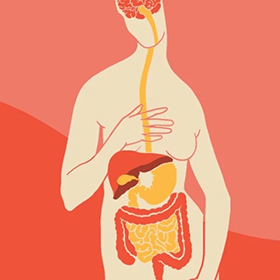
Parkinson’s disease (PD) is a scary, relentlessly progressive neurodegenerative disease which is now showing up in more people and younger populations than ever before. It is believed to be a consequence of both genetic susceptibility and a number of environmental factors including gut health, resulting in increasing neuronal oxidative stress.
A large amount of evidence now shows the involvement of the gastrointestinal tract in PD, including alterations in the microbiome, intestinal permeability (leaky gut) and more recently, the role of beneficial metabolites of the microbiome, such as short chain fatty acids (SCFA) in PD.
The fermentation of dietary fiber in the large intestine by specialist microbes in the gut leads to the formation of a variety of gases and metabolites. SCFAs including acetate, propionate, and butyrate comprise 90–95% of all microbiota metabolites produced in the colon. Although there are no studies evaluating acetate and propionate singly in PD, butyrate has been studied and the majority of preclinical evidence suggests that it could be beneficial in many aspects and even the treatment of PD.
Apart from being the preferred energy source for the gut cells and its role in gut health, butyrate is involved in anti-inflammatory, gut hormone and epigenetic mechanisms that influence many aspects of our health, including brain function. A few studies using oral administration of butyrate have even shown a beneficial effect in PD animal studies; however, prebiotic fibers that generate butyrate locally in the gut may be more effective suggesting that the use of prebiotic fibers that lead to the production of butyrate could stop its development. It is likely that the action of butyrate on maintaining gut health through the gut barrier and inflammatory pathways are important in maintaining gut homeostasis. Reports also show increased blood levels of circulating butyrate in healthy subjects consuming more dietary fiber that can reach the brain.
Therefore, promoting increases in butyrate produced in the large intestine, the gut is a promising and simple approach in preventing and treating PD that could have implications for many people.
However not all fibers and prebiotics are the same and fiber features such as the differences in solubility degree, and chemical and physical structures are important factors in allowing the right type of bacteria to grow and produce butyrate in the right locations in the gut. Increasing one type of fiber like psyllium that acts in one part of the colon is not likely to show major results.
It is best to get your fiber from a diversity of plant based foods especially your nuts and seeds, as well as supplementing with whole gut fiber foods like Kfibre that are fermented all the way along the large intestine to produce butyrate and the other SCFA’s.
Source
Front Neurol. 2019; 10: 663. Published online 2019 Jun 20. doi: 10.3389/fneur.2019.00663. PMID: 31281287 Potential of Prebiotic Butyrogenic Fibers in Parkinson’s Disease Thaisa M. Cantu-Jungles,1 Heather E. Rasmussen,2,* and Bruce R. Hamaker1